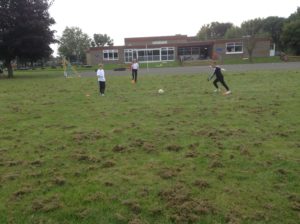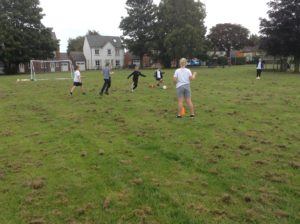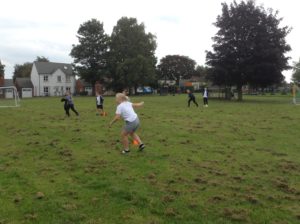These five lessons will roughly match the teaching and learning happening in class.
Year 6 children:
These five lessons will roughly match the teaching and learning happening in class.
Lesson one: video, activity, answers
Lesson two: video, activity, answers
Lesson three: video, activity, answers
Lesson four: video, activity, answers
Lesson five: video, activity, answers
You don’t have to print the worksheet. Your child can write or draw their answers on paper. Your child’s learning will be most effective if you sit with them to pause the clip and check / praise / support your child as the clip moves on.
Practise times tables on Times Table Rockstars, too. We’re concentrating on the 2,5,10 times table. Email the class teacher if you need your child’s login and password details.
(Suggested time: 30 minutes of Maths and 15 minutes of Rockstars daily)
Spelling
Look on the homework page to find this week’s spellings. Your child should complete one task each day.
- Day 1: Generate more words linked to the spelling pattern or ‘rule’. (You could look out for the words in the book you’re reading at home, or any other text.)
- Day 2: Practise the spellings using two of the ideas in our Super Spelling Strategies guide. (Set yourself and others at home a challenge of using some of the words when you’re speaking, too!)
- Day 3: Write separate sentences, each containing one of the spellings. Don’t forget to show off really neat handwriting and make sure you sentence starts with a capital letter and ends with a full stop, exclamation mark (!) or question mark (?).
- Day 4: Repeat Task 2 or 3.
- Day 5: Get an adult at home to test you on your spellings. Practise any you spell incorrectly – you could write them out carefully until you’re sure.
(Suggested time: 15-20 minutes daily)
Reading fluency
This week’s fluency text is a poem: Matilda who told lies and was burned to death.
In school, we generally follow this sequence:
- Day 1: Read the text aloud with your child listening. Read it clearly and slowly, pointing to each word as you read. Have a chat about any unfamiliar words.
- Day 2: Read aloud each sentence (a full short sentence or part of a longer sentence), and have your child read it back to you. Do this ‘echo reading’ for the whole text.
- Day 3: Read the text and talk about the effect of the punctuation on how you read it – pauses for full stops and expression for exclamations (!) or questions (?). Your child reads the text aloud.
- Day 4: Read together with expression (just like you practised on Day 3).
- Day 5: Your child reads independently and fluently.
(Suggested time: 15 minutes daily)
Reading comprehension
Day 1: RIC about hedgehogs.
RIC stands for:
- Retrieve: finding information in a text
- Interpret: using clues in the text to unlock information
- Choice: thinking about the author’s choice of words, techniques or organisation that make the text interesting and enjoyable to read
Day 2: Agree with your child three words from any text they’ve read which they’re less familiar with. Your child should find out what they mean (eg by checking an online dictionary or simply discuss with you) and how to use them in sentences (both when speaking and when writing). Challenge your child to write a sentence with each word in, or to drop the words into conversations at home.
Day 3: Read this article from First News, a newspaper for children, and complete the activity.
Day 4: Read your fluency or RIC text again. Next, do one of the following:
- Your child could list at least ten facts they’ve read in the text. (If it’s a fiction text (a story), then the facts would be based on the story, like ‘Harry Potter picked up his broomstick’, rather than actual facts from the real world.)
- Your child could create questions and answers for what they’ve read. (For example, it could be a TV or radio interview based on what they’ve read.)
- Your child could create their own ‘RIC’ questions.
- Your child could draw and label a character or setting that they’ve read about.
Day 5: Book Club. Once a week, we have a relaxing lesson where we sit and read quietly, often with an adult. At home, we’d like you to read your favourite book or text, too.
(Suggested time: 30 minutes daily)
Writing
Activity 1: This series of lessons from Oak Academy is about persuasive writing. To help you with activity two, watch a different video each day and apply what you have learned to your own persuasive writing in activity 2.
Activity 2:
Last week, children started to design their own invention to help adventurers in the great outdoors! From a multi-functional grapping hook to a chameleon suit, the children drew and labelled their designs. This week we’d like the children to write a persuasive report trying to sell their product to the public. Imagine Dragon’s Den for writing.
(Suggested time: 30 minutes daily)
Topic
This week’s topic learning is linked to geography.
Using this text from last week’s home learning and this BBC website, compare and contrast this region of Bolivia to the Lake District. What are the similarities and differences? You can use Google Earth to help with this comparison.
(Suggested time: 30-45 minutes)
Science
We’re observing plants and animals.
As you can’t get out and about to collect your own leaves, read the information about leaves on this website. Watch this video about leaf classification. Make your own classification key for 6 different trees.


